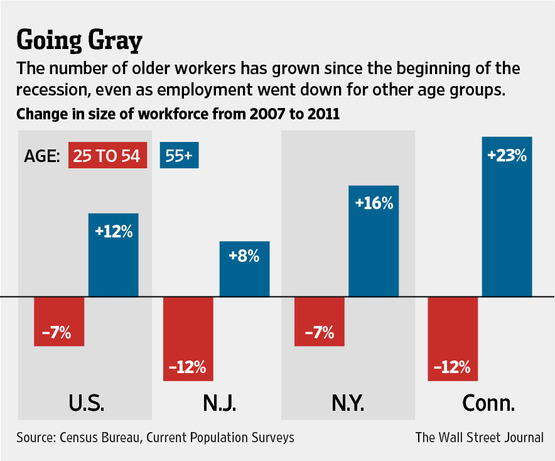|
Seniors Rise in Work Force After
Slump
Joseph
De Avila, Wall Street Journal
March 25, 2012
After
the recession thinned the ranks of
employed New Yorkers, one group has emerged
from the downturn with improved standing
in the labor force—older workers.
One in five working New Yorkers
is now 55 years or older, according to
the latest figures from the U.S. Census
Bureau, a sign of both the aging of the
baby boom generation and of older
workers holding on to jobs longer in the
face of savings diminished by the
recession.
While young and middle-aged
workers in New York may still be
struggling to find work after the 2008
recession, older workers are becoming a
larger part of the work force,
increasing by 16% since 2007, according
to the Census. At the same time, working
New Yorkers between 25 and 54 declined
by 7%.

States across the country, including
neighboring New Jersey and Connecticut,
have experienced similar trends, as
older workers become more educated, stay
healthier and work later into life.
"The numbers will continue to go up,
particularly as more boomers hit their
60s," said Sara Rix, senior strategic
policy adviser with AARP Public Policy
Institute.
Baby boomers—generally defined as those
who were born between 1946 and 1964—now
make up about a quarter of the
population, both nationwide and in New
York. By 2030, nearly one in four New
Yorkers will be 60 years old or older,
said John Cochran, assistant director of
the New York state Office for the Aging.
To be sure, the past four years have
been painful for many older workers.
While the unemployment rate for people
older than 55 is 5.9% nationally—it is
8.3% overall—they often have a tougher
time finding jobs once they are
unemployed, taking about 54 weeks to get
a new job compared with 36 weeks for
younger workers, according to the Bureau
of Labor Statistics.
The recession also drained the savings
of many older workers, forcing them to
delay retirement.
"Certainly the economic downturn has
created a lot of pressure for people,"
said Marcie Pitt-Catsouphes, director of
the Sloan Center on Aging and Work at
Boston College.
In some cases, older New Yorkers like
Susan Stone, of Ossining, N.Y., in
Westchester County, may never retire.
Ms. Stone, who said she is in her 60s,
was laid off in 2009 from a job as a
speech pathologist. She has been working
part-time for about a year doing
strategic planning and marketing for a
nonprofit that helps senior citizens in
Manhattan.
Ms. Stone got her current job through
ReServe Inc., a group that connects
older workers to the nonprofit industry.
But she only works 14 hours a week and
scrapes by to pay her condo mortgage.
"The bottom line is that it's an
impossibility for me to retire,
especially now that I haven't been able
to build up income for the last three
years alone," said Ms. Stone, who is
looking for additional consulting work.
"I'm eating up whatever savings I had,
which was never significantly high.
Social Security certainly is not the
answer."
Older workers began growing in number
during the late 1980s and 90s, said Ms.
Rix, as the employers began switching
from pension retirement plans to 401(k)
accounts, which put more of the savings
burden on employees. Changes to Social
Security have encouraged older people to
continue working by offering larger
payments for retiring after the age of
70. And the trend is also fueled by
better physical health habits and more
white-collar jobs that don't take the
same toll as manual labor.
"More people are in the types of jobs
that facilitate a later working life,"
Ms. Rix said.
Older workers are a growing sections of
the work force even as they remain the
least educated, according to the Census.
About 20% of people 65 and older have
college degrees, and government
officials such as Mr. Cochran say that
boosting those numbers to help them
compete with better educated young
people will be the biggest challenge
confronting older workers.
"Are those skills still applicable and
are you ready to compete?" Mr. Cochran
said.
Meanwhile, employers are offering more
job training as employees get older,
said Ms. Pitt-Catsouphes of the Sloan
Center on Aging and Work. After the
recession, "no one wants to get caught
off guard and say, 'My skills are out of
date,'" she said.
Many workers have decided to use their
current skill set for as long as
possible.
Jennie Lyons, 65, wants to be able to
say she has been teaching for at least
20 years before she retires. That means
Ms. Lyons, from Tarrytown, N.Y., will
continue teaching computer science at a
private school in Westchester until she
is at least 69.
"I think it's going to take me saying,
'I'm done teaching,'" Ms. Lyons said.
"And I'm not done teaching yet."
Working those additional years will also
help her add to her savings before she
finally calls it quits, Ms. Lyons said.
"The longer I work, the easier it will
be to retire."
Others like Marcia Rose Yawitz, a
commercial real-estate broker, say they
never think about quitting even though
they can afford to retire comfortably.
Her competitive side won't let her do
it, she said. "It's just not in the
genes," says Ms. Yawitz, 77, from the
Upper West Side. "They say they are
going to have to carry me out of here."
|



